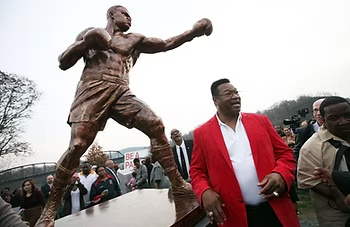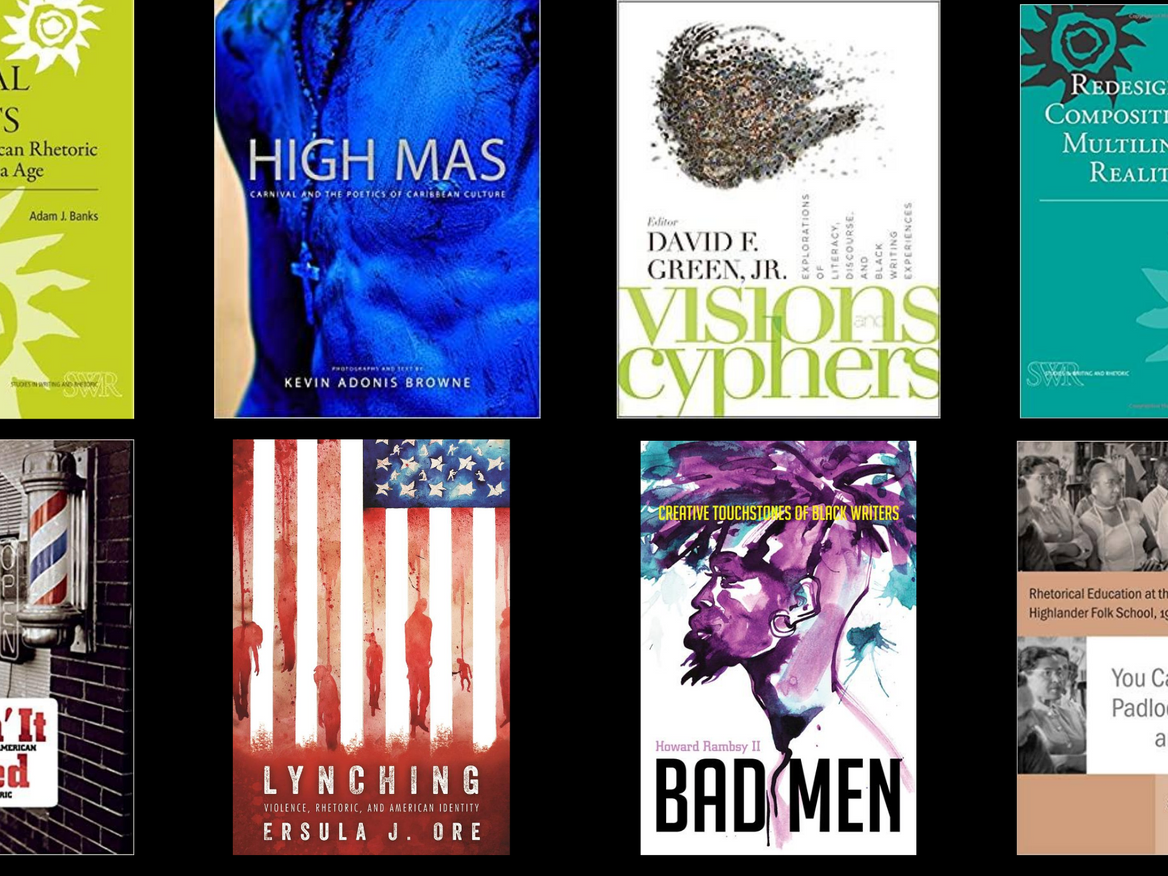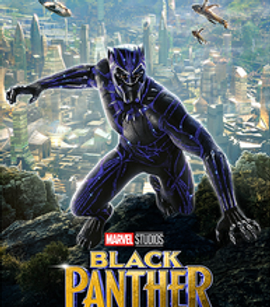I mentioned in the last post that I once commented about the need for a literary movement for Larry Holmes. I thought those remarks, made in ” Konch” magazine years ago, were still available online. However, I was told that they aren’t. So, because people asked—and because of another Muhammad Ali documentary—I include some of them on “The Language Lane.”
Ishmael Reed says Larry Holmes had been a greater boxer than Muhammad Ali. I’m not going for that one. Nor is Vorris Nunley going for it. We’re sitting in a cafeteria on the campus of Penn State. Ishmael’s spoken brilliantly for two days on literature and cultural politics. Vorris and I have enough sense to listen seriously when he expounds on these topics, and we know he loves and is knowledgeable about boxing, too. But Holmes over Ali? All the trickster figures in all his novels combined, all the conjuring in his poetry, couldn’t manipulate me into believing that. Legions of other sports observers feel the same way. Just a few weeks prior, Ali had been named Athlete of the Century by USA Today, He also had gotten the nod from Sports Illustrated. He was top three in every major poll, including those of the Associated Press and ESPN. This was based upon consideration of all sports. I don’t always flow with the consensus, but I undoubtedly do this time. Seems to me that the only worthwhile boxing arguments to be made relative to Ali involve Joe Louis, Sugar Ray Robinson, and maybe the Mike Tyson we never got to see. But Ishmael jabs anyway, says Ali really lost to Doug Jones early in his career, lost to Holmes late in his career. He argues that Holmes was really undefeated when he retired the first time, that he had been robbed of his title by the ringside judges, never really lost to Michael Spinks. Nothing I hadn’t heard before. I throw easy counters. Ali was an Olympic champion at the precocious age of 18 and world heavyweight champion at the age of 22. When Larry Holmes was 22, he couldn’t even make the Olympic team. The United States was left to send out the immortal Duane Bobick to battle the best amateur heavyweights from around the world. So, really, what would the 21-year-old Holmes have done against the same admirably skilled Doug Jones that the 21-year-old Ali fought? And you don’t want to make much of a Holmes victory over a 38-year-old Ali, no more than you’d want to spend time pondering a Tyson victory over a 38-year-old Holmes. Spinks? That the bouts went the distance says too much. Larry is definitely behind on points here.
Now these arguments do not close the case against Holmes. He was the quintessential late bloomer and in my view one of the five best heavyweight champions of all time. Twenty title defenses, one more than Ali had, are a noteworthy credential. He had heart, class, and a ramrod left jab, maybe the heavyweight division’s best ever. He stood his ground and spoke his mind insightfully and with wit. He broke Don King’s exploitative hold on him, was correct that Marciano could not have carried his jockstrap, and the “I’m not Tommy Morrison” explanation that he offered in 1992 to a befuddled Ray Mercer, brutal vanquisher of the once highly touted Morrison, was one of the funniest quips I have heard a boxer utter during a bout. More important, back to the question of class, he let Ali off the hook when he could have hurt him badly. That humane gesture made Holmes forever cool with me.
Maybe Holmes even beats Ali if they meet in their primes on a given day. I rate Holmes with the best and one of the definitions of the best is that they can beat the world when they’re on top of their game. So if you’re truly among the best, and Holmes is, the rhetorical case can always be made—if the rhetoricians are as good as their fighters are—that you could win a particular fight. This verbal practice contributes an ample share to keeping bars lively until closing time. But beyond the simple “who would have beaten whom,” I find the question of who would have prevailed more frequently to be more legitimate. My mind says that in Ali-Holmes contests, it wouldn’t have been Holmes, especially when I recall how easily a washed up, dried out (all those thyroid tablets) Ali bounced a sneaky but emphatic right hand off of Holmes’ head in round two of their real matchup. I see a youthful, stronger Ali landing that punch often and with far more effect.
Perhaps the most interesting issue concerning comparisons between Ali and Holmes is “greater,” as I think Ishmael initially put the matter and, in any event, involves more than hypothesizing about physical superiority. Measuring greatness has to do with acknowledging what did indeed occur and analyzing what it meant. In this regard, Holmes faces three obstacles that now prevent him from being as great as Ali: lack of appropriate competition, lack of sufficient social significance, and lack of a literary movement. He has to clear at least one.
To be “The Greatest,” you need to be in some of the greatest fights. That’s partly why Ali wears the moniker so well. Your mettle has to be tested against the fiercest, most intense competition under the brightest, hottest spotlights. Ali conquered the legendary and fearsome bad boy Sonny Liston, won the epic three-part series with Joe Frazier, and shocked the world all over again in the momentous and miraculous battle with the awesome George Foreman in front of seven hundred million witnesses.
But whereas Ali struggled with Joe Frazier, Holmes did a light shuffle with Marvis Frazier. Marvis had half his father’s chromosomes, the most allowed by law, when a full cloning was required to give him a chance. Earnie Shavers made life interesting for Holmes but not really for us. Their fights don’t quite classify as historic drama. I suppose the Gerry Cooney fight was impressive, but became less so after Cooney’s other famous flame outs against an undersized Spinks and a puffed up, elderly Foreman. Besides, I cannot help remembering sitting in Madison Square Garden in the mid-1970s watching the finals of the Golden Gloves and watching a 5’-8” Johnny Davis reach up to TKO the 6’-6” Cooney in the light-heavyweight finals. Cooney never had it. No, what Holmes needs in this debate more than anything else, because I actually wouldn’t mind seeing his status escalate considerably, is a young, renewed, rebounding, well-trained, improved, psychologically ready, post-Ali George Foreman. They need to touch gloves, say, three times between 1978-1980, when both are between the ages of 28-31. Holmes needs at least two scintillating victories to climb into Ali’s category based on fights. That’s what he needs, but obviously can’t get. Beating Foreman wasn’t guaranteed anyway.
Holmes, then, should perhaps try to become a significant figure from the 1960s. He should fraternize with Malcolm X, denounce the war in Vietnam, and be egregiously wronged by the government and boxing establishment. He needs to become one of the cherished symbols of 1960s-style and 1970s-style Black pride and be revered by millions of baby boomers of all ethnicities who like to think that they themselves were more activist and revolutionary and more accepting than they were, and could forgive, forget, or not care at all if Holmes called Black opponents bears and gorillas and campaigned for Ronald Reagan in the 1980s. Then he needs to have his significance continue to grow, as his heroism is at the same time systematically decoupled from his Blackness, while he winds up a sympathetic figure to some because of a debilitating disease, say Parkinson’s. But he can’t pull this off either.
At this point, the only chance for Holmes to receive Ali-like recognition is through a literary movement. Perhaps Gerald Early can assist since he’s often trying to square literature with the squared circle. Early has given Jack Johnson the Harlem Renaissance, positing that the Harlem Renaissance was a high point of the larger New Negro Movement and that the New Negro Movement began in 1908 when Johnson became the first Black man to capture the heavyweight title. Early argues that Johnson, the audacious, rebellious, social transgressor—jazz, white women, etc.—fired the imaginations of the youngsters who would later emerge as the stars of the Renaissance. I’m not sure Countee Cullen, the central poet of the Harlem Renaissance, would ever have gotten around to writing a Johnson version of his famous poem “Heritage.” “First butterfly, original bee/What is Jack Johnson to me?” I don’t think so. Miles Davis cutting an album titled Jack Johnson, as he did, seems right, much as Miles loved boxing and with all that boss attitude Miles had. But I do understand Gerald’s point. Ali had that kind of influence on a bunch of us when we were ten, eleven, twelve. He was our great vicarious, in-your-face, up-against-the-wall thrill. For us, he whipped Whitey, Uncle Tom, and Gunga Din. He put his bold masculinity in the air; we inhaled. Our folk hero, he walked so many of us through our youths, even if some of us were overly wayward at times (still too much like Liston). When Ali triumphed, our best view of the world was confirmed. The most nervous time I ever spent listening to the radio was during his second fight with Frazier, that Mayor Rizzo supporter. If Ali loses, then Frazier is seen as better. I couldn’t take that. Ali was too important, a prominence long understood by literary types, among others.
I still own one copy of Black World. January 1975. There’s a nice spread covering the National Black Writers Convention held at Howard University, featuring Stephen Henderson, Maya Angelou, Piri Thomas, Askia Muhammad Toure, Mari Evans, Kalamu ya Salaam, Paule Marshall, Ron Milner, Richard Wesley, and Ishmael Reed himself. Beautiful stuff. But the reason I never let that issue get away from me is because Ali’s picture is on the cover. Sam Yette, Clay Goss, and Quincy Troupe contributed articles on him, that literary attraction.
Ali probably has a greater and more direct claim on African American and overall literary output than does Johnson. If Johnson gets the Renaissance, Ali gets the Black Arts Movement and beyond, recent poems about Johnson like Yusuf Komunyakaa’s “Boxing Day” notwithstanding. Wole Soyinka wrote a wonderful poem called Ali at the Ringside,1985, though he sounds terrible reading most of it. His stentorian stiffness can’t evoke the rhythmic movements of The Greatest. Elizabeth Alexander, who was a toddler when Ali first beat Liston, created the excellent Narrative: Ali. It’s billed as a poem in twelve rounds and is one of my favorites. There are autobiographies, biographies, films. David Remnick’s King of the World. Flip Schulke and Matt Schudel’s The Birth of a Legend, Miami, 1961-1964. Early’s Muhammad Ali Reader with contributors like Tom Wolfe, Joyce Carol Oates, Gay Talese, and Norman Mailer. All that attention can indeed keep you mythic.
In the final analysis, this is what Holmes supporters have to deal with. But at least their guy is leading them, as strongly as he led with his jab, by publishing his long overdue memoir, Larry Holmes: Against the Odds. Being Holmes, he would do it in the middle of an Ali resurgence in the media, but he has always gone about greatness the hard way. Nonetheless, the book scores well. It’s an inspiring tale about a guy, the non-prodigy, the outsider, the seventh grade drop (push?) out, the figurative son of John Henry, the literal son of John Henry Holmes who comes way off the pace to win big. After astoundingly lucrative purses had come into boxing, Holmes pocketed all of 63 dollars for his professional debut. Two years after Ali and Frazier had split millions to fight in Madison Square Garden, Holmes fought there for 193 dollars. In 1978, he netted all of $75, 000 for winning the title. However, because of discipline, fortitude, courage, and stamina, he persevered to prosper enormously. This is normal Horatio Alger chic. The story gets more interesting when Holmes hangs onto and invests all those millions, breaks the cycle of Black, financially strapped (Ali included) heavyweight legends, becomes a community-minded employer, and emerges as politically astute. Although his desire for money has been well documented, he turned down a $30 million offer to fight in apartheid South Africa. Like Ali, he was a colorful quote machine. Nothing as dramatic as declaring he had nothing against the Viet Cong, but when asked his opinion about Marciano scoring a knockout over him on a computer bout, he answered, “What do you expect from a white computer?” Immediately after the second Spinks fight, he remarked that, “The judges, referees, and promoters can kiss me where the sun don’t shine. And because we’re on HBO. . .that’s my big black behind.” Holmes apologizes for some of this, I guess still worried about his reception in a media that has portrayed him as racist at times despite the fact that Holmes was always, with his Black, White, Latino, and Korean entourage, probably as racially sane as anyone in America can be. So don’t apologize too much, Larry. Your writers are going to need the good stuff.





